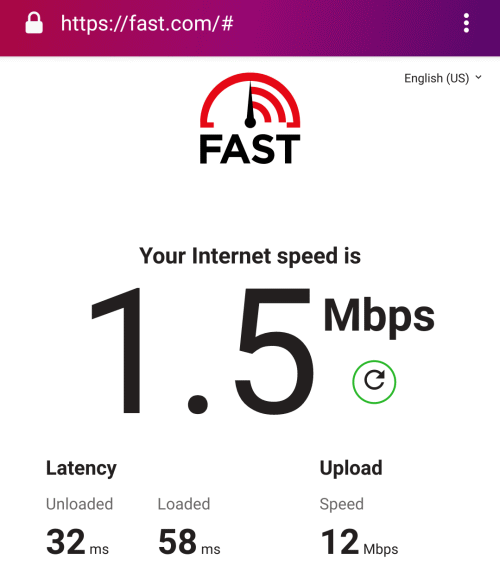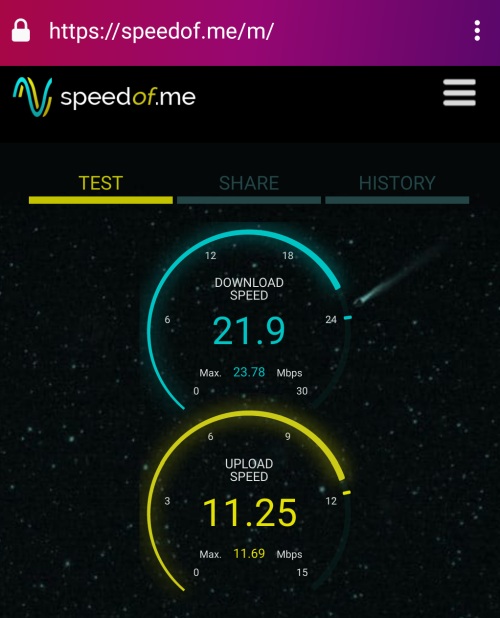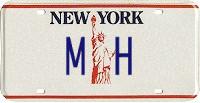| Michael Horowitz |
Home => Internet speed tests
|
| Michael Horowitz |
Home => Internet speed tests
|
| [Formatted for Printing] | From the personal web site of Michael Horowitz |
March 24, 2020
Every publication has, or is, writing an article about improving your Wi-Fi speed. Those I have read so far has been miserably incomplete. One aspect of this is the Internet speed test.
Recently I purchased a 4G/LTE router. You insert one or two SIM cards into the router and it uses 4G/LTE data for Internet access. You connect to the router, just like any other, with Ethernet or Wi-Fi. When I first tested the speed offered by the cellular company it was miserably slow. Today, I tested it again.
BACKGROUND: The router is no speed demon. It is meant to work as a backup, for when a primary, wired Internet connection either fails or slows down. Its Wi-Fi only runs on the 2.4GHz band and its Ethernet ports are only 100Mbps. Think of it as a spare tire in the trunk of a car.
I tested using an Android 10 phone with excellent (-50dBm) signal strength. The tests were done in a crowded Wi-Fi area, so they may have been subject to interference on either the used Wi-Fi channel or an adjacent one. As is the norm, the 2.4GHz channel was 20MHz wide.
|
I started with the simplest test, the fast.com website from Netflix. As you can see, it reported a miserable 1.5Mbps download speed and a perfectly acceptable 12Mpbs upload speed. Next, I tried the Speedtest app, which reported 16Mbps down and 4Mbps up. Hoping that the Fast.com result was a fluke, I ran it again, but from a different browser. The download speed this time was 1.4Mbps down and 11 Mbps up. These drastically different results led me to try some other speed tests. |
 Fast.com speed test results |
|
The Ubiquiti WiFiman app reported 24 Mbps down and 13 Mbps up. The speedof.me website (shown at the right) reported 22 Mbps down and 11 Mbps up. So, three tests reported download speeds of 22, 24 and 16, whereas fast.com was stuck at 1.5. Finally, I tried the fast.com website again, and again, it reported a download speed of 1.5 Mbps (and 12 Mbps up). At least it's consistent. So, if your Wi-Fi feels slow, don't trust a single speed test. |
 Speedof.me test results |
UPDATE: March 29, 2020. A light bulb went off over my head. Someone commented on this and it got me thinking again about why Fast.com would report such different results. After a while, a perfect explanation occurred to me. The router is connected to a cellphone company. What's different about 4G/LTE compared to a home Internet connection? Data usage to a cellphone provider is much more precious than it is to a company offering a wired coaxial cable or optical connection. The cellphone company surely wants to limit streaming video to cut down on their bandwidth usage. And, Netflix, which runs the Fast.com site, is the home office for streaming video. It is very likely that the cellphone company is limiting Netflix speeds and that is why Fast.com never tests at faster than 1.5Mbps.
This just makes my earlier conclusion all the more valid: do not trust a single speed test.
- - - - - - -
UPDATE: April 1, 2020. It turns out Netflix throttling on cellular data networks has been a thing for years.
In March 2016, Netflix admitted to throttling: Netflix throttles video on AT&T and Verizon to keep users under data caps. The thinking at the time was that Netflix was afraid of losing customers if their videos consumed too much of the monthly data allowance. The speed limit, at the time, was 600kbps. A standard quality stream uses 3Mbps and high definition uses 5Mbps. In their own words: Helping Netflix Members Get More from Their Mobile Data Plans by Netflix, March 2016.
Then, in August 2019, we learned that the cellphone companies were doing their own throttling of Netflix and other video streaming services. From CBS News: Wireless carriers slow streaming video content even in off-peak hours. Researchers from Northeastern University and University of Massachusetts Amherst conducted more than 650,000 tests in the U.S. and found that from early 2018 to early 2019, AT&T throttled Netflix and YouTube about 70% of the time but did not slow down Amazon Prime Video. T-Mobile throttled Amazon Prime video about half the time, Netflix and YouTube a bit more often and never throttled Skype.
So, whether it was Netflix or the cellphone provider, doing the throttling, the slow speed shown by the Netflix speed test (fast.com) is no surprise at all. Live and learn.
| | ||
| @defensivecomput | TOP | Home => Internet speed tests |
| michael--at--michaelhorowitz.com | Last Updated: April 1, 2020 5PM UTC | ||

Copyright 2001-2024 |
Copyright 2001-2024 |